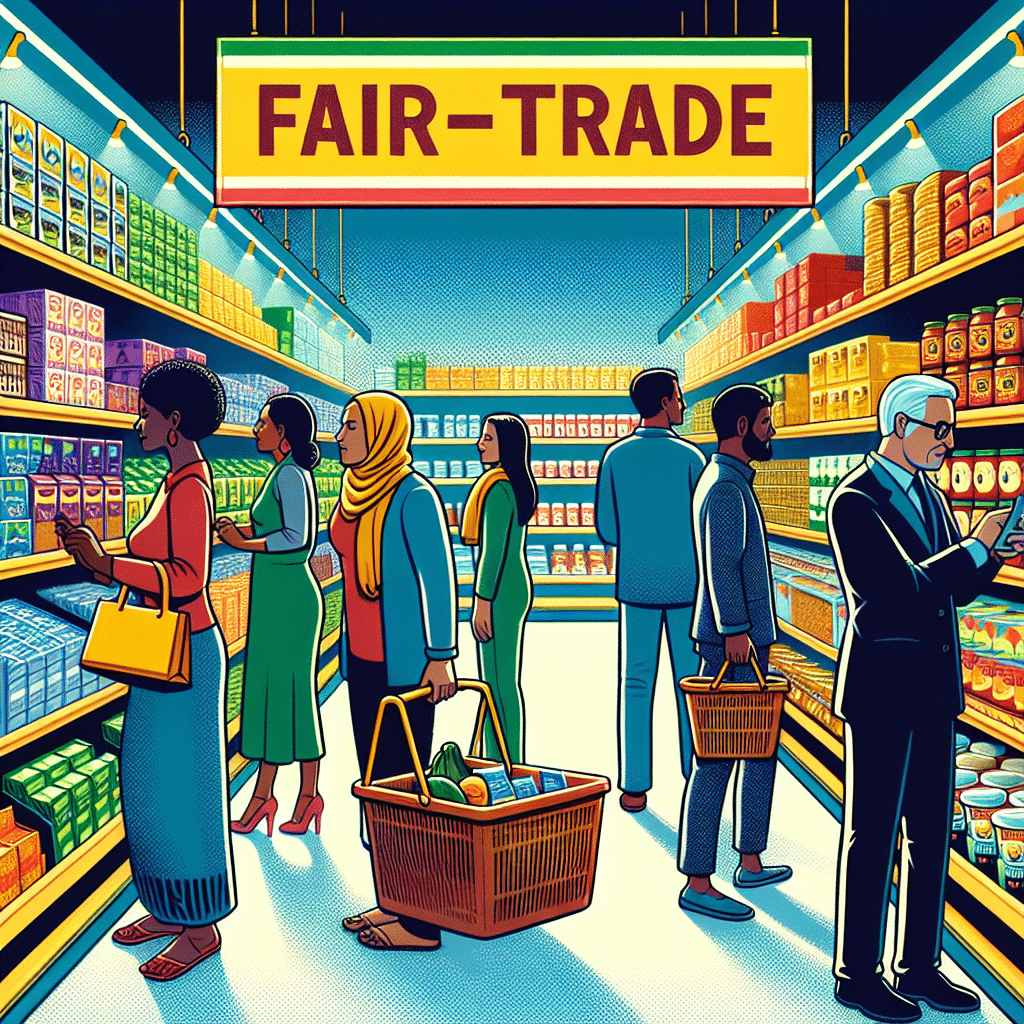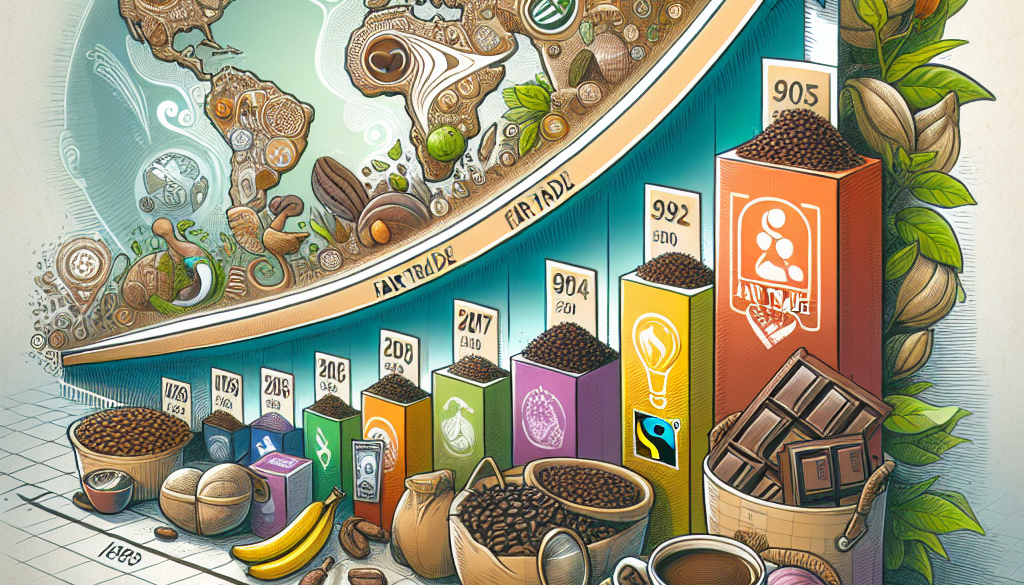Choosing Ethically: The Rise of Fair-Trade Products
-
Table of Contents
Fair-Trade Products: Navigating Ethical Consumer Choices

In an era where consumer awareness is at an all-time high, the demand for ethically sourced and produced goods has seen a significant rise. Fair-trade products have become a beacon for those looking to make responsible purchasing decisions that support not just quality, but also the welfare of the people behind the products. This article delves into the world of fair-trade, exploring its importance, impact, and how consumers can choose ethically.
Understanding Fair-Trade: Principles and Impact
Fair-trade is more than just a label; it’s a movement that aims to empower producers in developing countries by providing better trading conditions and promoting sustainability. The core principles of fair-trade include fair wages, safe working conditions, environmental protection, and the prohibition of forced labor and child labor. By adhering to these principles, fair-trade organizations help to ensure that the people at the beginning of the supply chain are treated with respect and dignity.
- Empowering Producers: Fair-trade initiatives help small-scale producers gain a foothold in competitive markets.
- Community Development: Premiums from fair-trade sales go towards community projects such as education, healthcare, and infrastructure.
- Environmental Stewardship: Fair-trade standards encourage sustainable farming practices that protect the environment.
Statistics from fair-trade organizations show that the approach has a tangible impact. For instance, Fairtrade International reported that in 2018, over 1.7 million farmers and workers were involved in Fairtrade certified producer organizations, with €169 million paid in Fairtrade Premiums.
The Growth of Fair-Trade Markets
The fair-trade market has grown exponentially over the past few decades. Consumers are increasingly looking for products that align with their values, and retailers are responding by stocking more fair-trade items. Categories such as coffee, chocolate, tea, and bananas are leading the way, with textiles and beauty products also gaining traction.
- Coffee: One of the most well-known fair-trade products, with a significant portion of the market now offering fair-trade options.
- Chocolate: The demand for fair-trade chocolate is rising as consumers become more aware of the often harsh conditions in the cocoa industry.
- Textiles: Fair-trade clothing and home goods are becoming more popular as consumers seek to avoid supporting sweatshops.
Case studies from companies like Ben & Jerry’s, which has committed to sourcing fair-trade ingredients for its ice cream, demonstrate the potential for large corporations to participate in the movement and make a substantial impact.
Challenges and Criticisms of Fair-Trade
Despite its noble intentions, fair-trade is not without its challenges and criticisms. Some argue that fair-trade standards are not strict enough or that the certification process can be too costly for small producers. Others point out that fair-trade products often come with a higher price tag, which can limit accessibility for consumers.
- Cost of Certification: The process can be expensive and complex, potentially excluding the smallest and most marginalized producers.
- Market Limitations: Fair-trade products still represent a small fraction of the overall market, limiting their impact.
- Consumer Price Sensitivity: The higher cost of fair-trade goods can deter budget-conscious shoppers.
Despite these challenges, the fair-trade movement continues to evolve, with new initiatives and models being developed to address these concerns and expand its reach.
How to Choose Fair-Trade Products
For consumers looking to support fair-trade, there are several ways to ensure that their purchases align with their values:
- Look for Certifications: Labels like Fairtrade International, Rainforest Alliance, and UTZ Certified indicate that a product meets certain ethical standards.
- Research Brands: Some companies have built their entire business model around fair-trade principles. Supporting these brands can have a significant impact.
- Shop Locally: Buying from local artisans and producers can also support fair and ethical trade practices.
By making informed choices and supporting fair-trade, consumers can contribute to a more equitable global trade system.
Conclusion: The Ethical Choice is Yours
The rise of fair-trade products represents a shift in consumer consciousness towards more ethical and sustainable purchasing habits. While challenges remain, the positive impact of fair-trade on producers, communities, and the environment is undeniable. By choosing fair-trade, consumers have the power to drive change and support a system that values human dignity and environmental stewardship.
Support Ethical Protein with ETprotein
For those looking to incorporate ethical choices into their diet, ETprotein offers a range of fair-trade protein products. Their commitment to non-GMO, allergen-free, and high-purity proteins ensures that consumers can enjoy the benefits of plant-based nutrition while supporting ethical practices. Whether you’re looking for organic rice protein, pea protein, or specialty proteins like watermelon seed or pumpkin seed protein, ETprotein has options that align with fair-trade principles.
About ETprotein:
ETprotein, a reputable protein and L-(+)-Ergothioneine (EGT) Chinese factory manufacturer and supplier, is renowned for producing, stocking, exporting, and delivering the highest quality organic bulk vegan proteins and L-(+)-Ergothioneine. They include Organic rice protein, clear rice protein, pea protein, clear pea protein, watermelon seed protein, pumpkin seed protein, sunflower seed protein, mung bean protein, peanut protein, and L-(+)-Ergothioneine EGT Pharmaceutical grade, L-(+)-Ergothioneine EGT food grade, L-(+)-Ergothioneine EGT cosmetic grade, L-(+)-Ergothioneine EGT reference grade and L-(+)-Ergothioneine EGT standard. Their offerings, characterized by a neutral taste, non-GMO, allergen-free attributes, with L-(+)-Ergothioneine purity over 98%, 99%, cater to a diverse range of industries. They serve nutraceutical, pharmaceutical, cosmeceutical, veterinary, as well as food and beverage finished product distributors, traders, and manufacturers across Europe, USA, Canada, Australia, Thailand, Japan, Korea, Brazil, and Chile, among others.
ETprotein specialization includes exporting and delivering tailor-made protein powder and finished nutritional supplements. Their extensive product range covers sectors like Food and Beverage, Sports Nutrition, Weight Management, Dietary Supplements, Health and Wellness Products, and Infant Formula, ensuring comprehensive solutions to meet all your protein needs.
As a trusted company by leading global food and beverage brands and Fortune 500 companies, ETprotein reinforces China’s reputation in the global arena. For more information or to sample their products, please contact them and email sales(at)ETprotein.com today.














